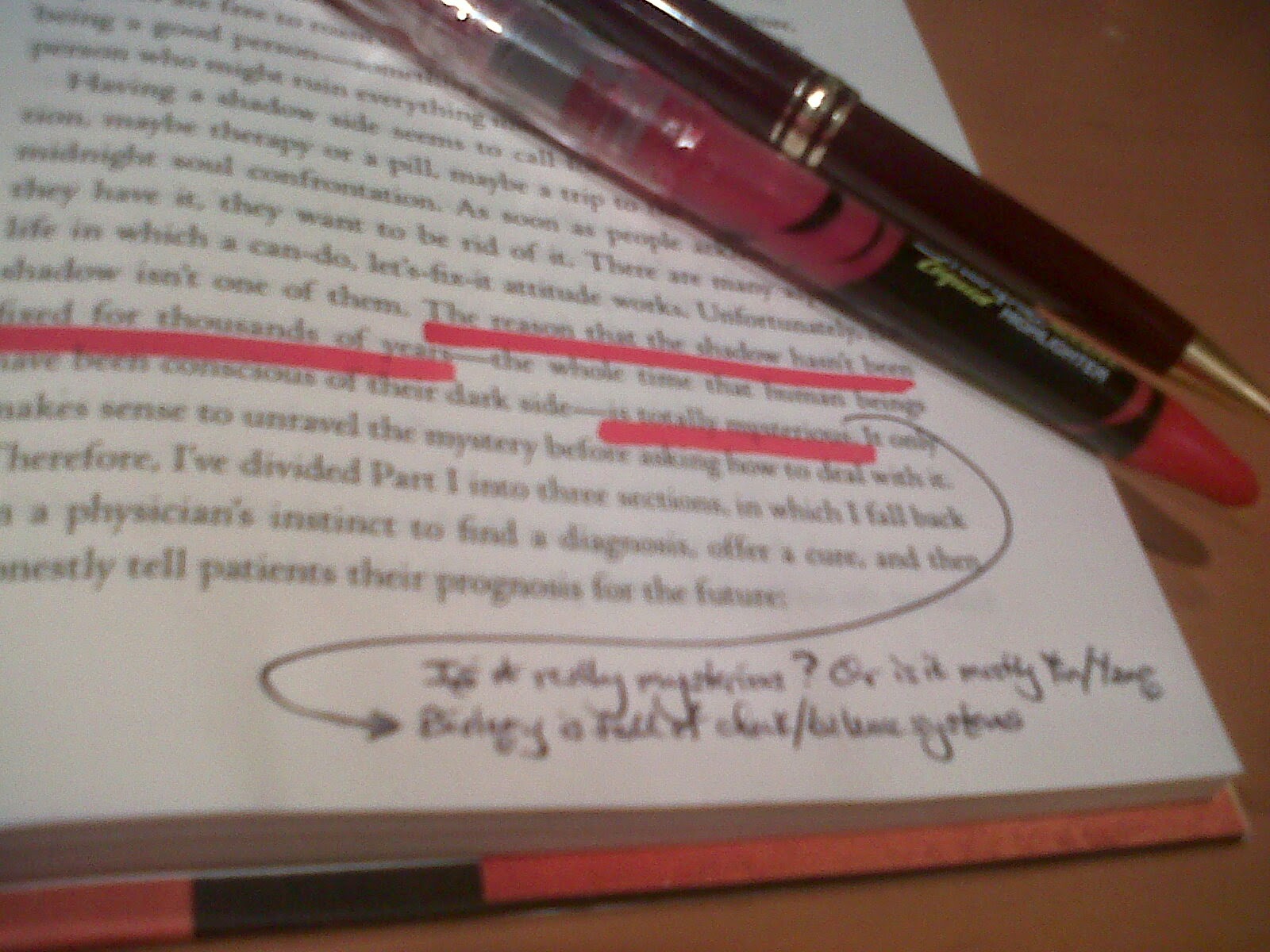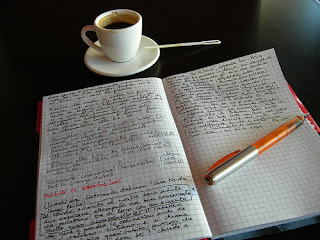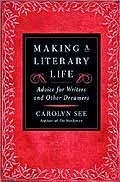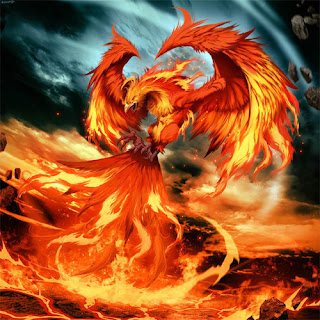Learning to Read like a Writer
Rodriguez
serious writer should be reading all the time. Buy books so you can reread and
mark them up, figuring out how they do the incredible things they do and how
they made the mistakes they made that you want to avoid. Read the first time
the way any reader does—for enjoyment and delight, to find out what happens
next. Then, read over and over—very slowly. Read and ponder. Read like a writer
reads—for technique. These writers are your teachers—for the cheap cost of a
book, $40 at the max for a big hardback. Learn everything you can from them.
Learn from the best. Then go practice some of those good techniques in your own
work. You can do this quietly in bits and pieces of time without having to go
away anywhere. You’re a writer. Think on paper.
are lots of areas in our life where we need to step out of our comfort zones in
order to grow and achieve our goals. It can be difficult to do this because it
feels so weird outside of the spaces where we’re accustomed to spending time,
and that leads to discomfort. Most of us, however, have learned that we have to
stretch ourselves at times. But we seldom do this in our reading. Teachers may
have made us read things we didn’t care for, but on our own—if we read at
all!—we read only what we’re comfortable with.
must read. We must read for enjoyment and delight and relaxation. We must read
to stay up with what’s going on in our field. Above all, we must read to
learn—and that involves sometimes leaving the warm cocoon of blankets and
stepping out onto the cold floor of books and authors we might never choose for
enjoyment.
tend to read people who write like we do, who believe what we believe, who have
the same style. It’s natural and normal—like looking in the mirror. I write
accessible poetry with a narrative behind it. When I turn to poetry, won’t I
read the same thing? I did. I still do. Reading Mary Oliver is like looking in
the mirror at myself—years younger, many pounds thinner, and much more
beautiful, it’s true—but an idealized self. My favorite kind of crime novels
tends to be novels that focus on character, complex plots, and fine writing. I
could recognize the artistry of good comic, pulp hardboiled, and puzzle crime
novels, but I tended not to read those except when I had to because they weren’t
“my” crime novels. But there were things for me to learn from these writers who
didn’t write “my” books—exactly because they wrote a different style of book
that required different skills. I could learn things from them that I couldn’t
learn from someone just like me.
is not just applicable to novels, either. You may only want to write fiction or
narrative nonfiction, so why would you read poetry? As a matter of fact, many
acclaimed writers of fiction, including some bestselling authors of commercial
fiction, start or end their days reading poetry because they want to learn the
skills of precise word choice, compression, verbal musicality, and many others
they can learn from poets who’ve worked for years to be masters of those
skills. The prose writers believe they can use those skills profitably in their
own novels, stories, and narrative nonfiction.
all writers offer examples of all of these skills? Of course not. You must
search out the best in each style or school. You always want to learn from the
best. Where else can you as a writer turn to learn from your reading? Well,
what do you want to learn?
narrative structure and plot your weakness? Do you never have any conflict in
your stories or books? Look to the best of mystery fiction. These are the
masters of narrative structure and plot. A good mystery has to have the plot of
what really happened and then the plot of the unraveling and discovery of what
really happened. Good mysteries have to have dramatic structures that are tied
into strong characterization, motivation, lots of conflict, and suspense. Good
examples can be found in authors like Nancy Pickard, Julia Spencer-Fleming,
Margaret Maron, and Louise Penny. (Also, many of our Stiletto Gang members!)
you unable to build a believable, engrossing background for your characters? Do
your characters wander in a void? The best writers in science fiction and
fantasy excel in world-building—making a fictional world so believable in its
details that it will draw the reader in as if it were a real place. They must
make worlds that never existed outside their heads into places that readers can
see and believe in. Game of Thrones,
anyone? Good places to start here are C.J. Cherryh, Ursula K. LeGuin, Octavia
Butler, and N.K. Jemison.
help with writing action scenes, check out men’s action adventure and technothrillers
with an explosion a minute. Can’t deal with emotion or relationships on the
page? That’s the romance writer’s specialty. Look to them for techniques.
(Again, see some of our Stiletto Gang members.)
as a writer can help you with any writing problem you have (except the
constants of procrastination and lack of confidence). If your current problem
is transitions, find writers who write fabulous transitions, even if you don’t
like the rest of their work. They may be literary writers or writers in some
commercial genre, but they write transitions that really work. Learn from them.
Take apart the way they write transitions. Identify their techniques. Then
practice them. This kind of reading to identify and break down skill and
technique is a valuable tool for any writer. Good writers have books that are
underlined, highlighted, and have notes scribbled in them.
REPLY TO COMMENTS (because Blogger hates me):
Linda will reply to comments later; a doctor’s appointment today turned into a little more than she expected.
Jan, lots of women writers have problems with physical action scenes when they start writing fiction, and action/adventure and techno-thrillers would be very helpful because they’re usually non-stop action. Those marked-up books are helping you to learn.
SuperB, I can still read for enjoyment, though I’m ever pickier, the more experienced a writer I become. But after reading through once for enjoyment and to become familiar with the story, I go through marking examples of the technique I want to learn and make notes on how the effect I want was accomplished.
I have a few writers where I do that, also, Ramona. Though I have started to take apart some of their older books to see how they made them so great.











I enjoyed reading this!
Men's action adventures and technothrillers are completely new to me. Reading them, however, could be quite inviting and fun — vicarious bravery for someone who stays in her safe world far too often.
I have some books in pairs: a clean copy for reading over and again and one which is marked. I don't know. For me, some of the marks detract from my attention. I'll be looking with this new perspective when I return to those books.
In some ways I find that reading like a writer has ruined reading for me. When you can see the technique you forget to enjoy the story! But I agree, there's a lot to be learned from every genre. It pays to broaden one's horizons!
Excellent points, Linda. For a couple of writers, I turn off the writer/editor and read like a fan girl, because I just want to enjoy. I assume I learn by osmosis.